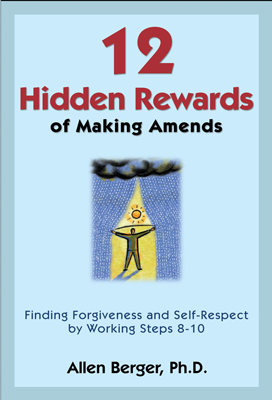Compassion is a Hidden Reward
An excerpt from
An Abridged Version of 12 Hidden Rewards of Making Amends
by Allen Berger, PhD., Hazelden Publishing
Part one of a two part abridged excerpt from the chapter, “Finding Forgiveness and Self-Respect by Working Steps 8-10,” from Allen Berger’s Book, 12 Hidden Rewards of Making Amends. Hazelden Publishing. Copyright 2013.
Working Steps 8, 9, and 10 opens us up to feeling compassion, acting compassionately, and forgiving ourselves and others. This is another hidden reward of working these three Steps.
A spirit of compassion evolves from the process of making amends and from a practice of self-examination. Being compassionate is a natural outcome of this process. By making a list of all the people we have harmed and discovering the pattern underlying our hurtful behavior, we can see that we were the common denominator in all our difficulties.
When we make amends, we engender compassion for ourselves and others.
We need to stop deflecting responsibility for what went wrong in our lives and instead gain insight into our own role in our problems. To ensure this will be a therapeutic exercise, we must rise above blame and be honest with ourselves about what we have done. We have to take responsibility for who we are and who we are not. We have to realize that we are imperfect, that we are in need of help, and that making mistakes doesn’t mean that we are a mistake. God doesn’t make any junk!
We need to see that we were misinformed, misled, and ignorant, not that we are bad. We were lost in our false-self and all of its nonsense. We were lost in our addiction; our brain was hijacked.

Taking responsibility for who we have been, what we have done wrong, and who we want to be is self-empowering. We cannot make sincere amends unless we are compassionate. The meaning of the word compassion demonstrates its importance in this process.
It is derived from the Latin word com, which is a prefix that means “together,” and pati, a suffix that means “to suffer.” Compassion, therefore, is sorrow for the sufferings or trouble of someone, accompanied by the urge to help.
When we make amends, we engender compassion for ourselves and others. We come to see how we have harmed others. We face the worst in us with the best in us. As we sit with the pain caused by our hurtful actions, a desire or urge to help ourselves and others will emerge. This desire motivates us to make amends and take responsibility for our actions. We become motivated to restore wholeness to our victims and to ourselves. We become motivated to right our wrongs, to forgive and be forgiven.


[…] PART ONE […]